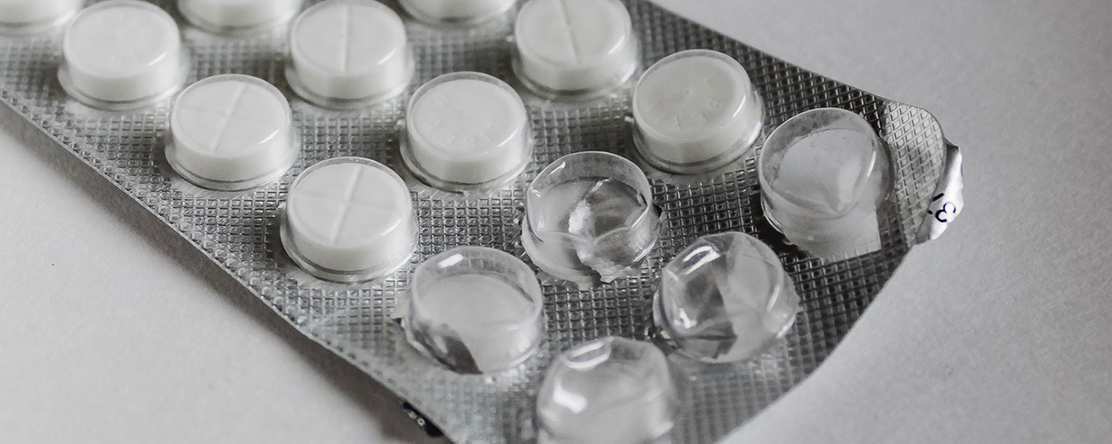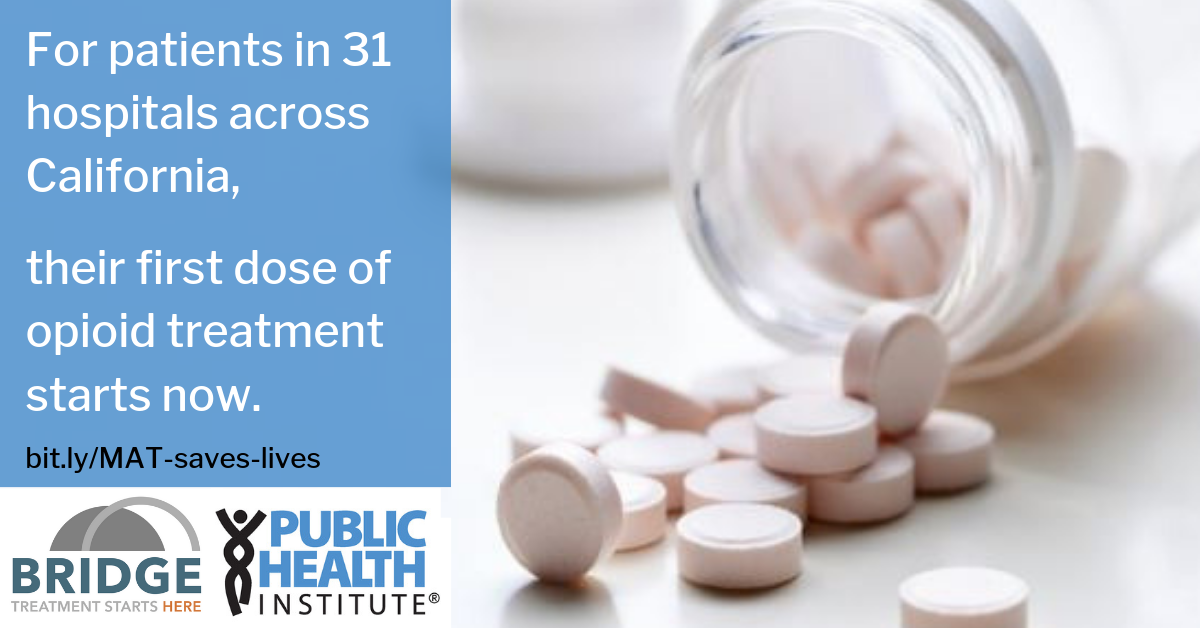
Press Release
California Bridge Program Selects 31 Health Facilities to Expand MAT for Opioid Use Disorder
-
Focus Areas
Alcohol, Tobacco, Drugs & Mental Health -
Issues
Rural Health -
Programs
CA Bridge

New Training Program Will Enable Emergency Rooms and Acute Care Hospitals to Initiate Treatment on the Spot
Oakland, CA (February 13, 2019) – The Public Health Institute’s Bridge program has selected 31 health facilities from across the state to participate in the California Bridge Program, an accelerated training program for healthcare providers that will enhance access to around-the-clock substance use disorder treatment in California communities hit hardest by the opioid epidemic. Program sites will collectively receive more than $8 million, along with training and technical assistance, to improve and increase access to treatment and referral of acute symptoms of substance use disorders hospital-wide. The Bridge program is funded through the Substance Abuse and Mental Health Services Administration (SAMHSA) State Targeted Response to the Opioid Crisis Grant to the California Department of Health Care Services (DHCS).

A referral to an addiction treatment program has been the most that hospitals have generally been able to provide for patients identified as needing treatment for opioid use disorder. The Bridge model treats emergency rooms and acute care hospitals as a critical window for initiating treatment. When patients in opioid withdrawal come seeking medical care, including for reasons not related to opioid use, they will be offered a dose of medication such as buprenorphine to ease severe symptoms of withdrawal, and then they will be connected with outpatient treatment in the community. Studies have shown that patients given this option of medication designed for addiction treatment are more likely to remain in care than those who are given referral information alone.
“By suppressing withdrawal long enough to create a bridge for patients to enter and remain in treatment, physicians can save lives,” said Andrew Herring, MD, Director of Emergency Department Services for the Bridge Program. “We know this model works, and now we are bringing it to hospitals and emergency rooms all across the state that are anxious for real solutions to address the enormous pain and suffering they see every day caused by the opioid epidemic.”
Though California ranks only 37th in the country for prescription opioid deaths, the death rates in 16 rural California counties are high enough to put them in the top 10 for the whole nation, and overdoses by synthetic opioids were up 44 percent in California in 2017.
Facilities selected for participation in the California Bridge Program are in regions facing some of the greatest need for substance use disorder treatment. Last month, Enloe Medical Center in Chico treated nearly a dozen people from a single mass overdose event that authorities suspect was caused by drugs containing fentanyl. St. Joseph Hospital in Eureka and Howard Memorial Hospital in Willits serve rural northern counties that consistently experience some of the highest opioid overdose death rates in the state. In Southern California, Arrowhead Regional Medical Center and Apple Valley Hospital treat patients in an area that has seen overdose deaths increase almost 50 percent in recent years.
The 18-month California Bridge training program will ensure that any interaction a patient has with the healthcare system can be a potential opportunity to enter into treatment. It approaches substance use disorder as a treatable chronic illness—creating an environment that welcomes disclosure of opioid use, provides rapid evidence-based treatment, and enables patients to enter and remain in treatment.
There will be three types of sites in the California Bridge program: Star Sites, centers of excellence for initiating treatment of substance use disorders from anywhere in the hospital; Rural Bridge Sites, where treatment will begin primarily in the emergency department with the support of substance use navigators; and Bridge Clinics, ‘low-threshold’ follow-up clinics patients can visit after starting treatment in the hospital setting.
“The Bridge program’s approach has the potential to radically change the trajectory of this epidemic,” said Mary Pittman, DrPH, president and CEO of the Public Health Institute. “Because our state leadership is driven by science instead of stigma, this program will be able to dramatically expand access to lifesaving treatment in California while demonstrating for the rest of the country the critical role the medical system can play in a broad public health response to the opioid crisis.”
California Bridge Program Selected Sites Include:
- Adventist Health Howard Memorial Hospital – Willits
- Adventist Health and Rideout – Marysville
- Arrowhead Regional Medical Center – Colton
- Central California Faculty Medical Group – Fresno
- Contra Costa Regional Medical Center – Martinez
- Dignity Health Memorial Hospital – Bakersfield
- El Centro Regional Medical Center – El Centro
- Enloe Medical Center – Chico
- Hanford Community Hospital – Hanford
- Harbor-UCLA Medical Center – Torrance
- Highland Hospital – Oakland
- Kaweah Delta Hospital Foundation – Visalia
- Marshall Medical Center – Placerville
- Northern Inyo Hospital – Bishop
- Olive View-UCLA Education & Research Institute – Los Angeles
- San Gorgonio Memorial Hospital – Banning
- Santa Barbara Cottage Hospital – Santa Barbara
- Santa Clara Valley Medical Center – San Jose
- Santa Rosa Community Health Brookwood Campus – Santa Rosa
- Scripps Mercy Hospital – San Diego
- Shasta Regional Medical Center – Redding
- Sierra Nevada Memorial Miners Hospital – Grass Valley
- St. Joseph Health & St. Mary’s Medical Center – Apple Valley
- St. Joseph Hospital – Eureka
- St. Joseph’s Medical Center – Stockton
- Sutter Lakeside Emergency Department – Lakeport
- UC Davis Health – Sacramento
- UC Irvine Medical Center – Orange
- UC San Diego Health – San Diego
- LAC+USC Medical Center – Los Angeles
- Zuckerberg San Francisco General Hospital – San Francisco
ABOUT THE BRIDGE PROGRAM
Bridge, a program of the Public Health Institute, is establishing a culture of evidence-based medicine to treat substance use disorders through an accelerated training program for healthcare providers that supports, enhances, and increases access to 24/7 treatment in every community.
More Updates
Work With Us
You change the world. We do the rest. Explore fiscal sponsorship at PHI.
Support Us
Together, we can accelerate our response to public health’s most critical issues.
Find Employment
Begin your career at the Public Health Institute.



